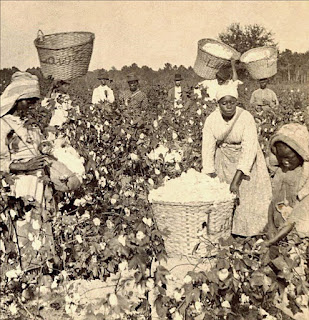This post is a response to an assignment in my “History
of Capitalism” course at Louisiana Tech University. I hope you find this analysis of Julia Ott’s
essay, “Slaves: The Capital that Made Capitalism” interesting.
Ott’s article makes the case that slavery was a
significant factor in developing capitalism in America and the world. In fact, she calls slaves “the capital that
made capitalism.”
According to Ott, slaves were essential for the
“industrious revolution” and the subsequent “industrial revolution.” The Industrial
Revolution was the result of surplus money and crops, leading to the
development of new technology. But before the Industrial Revolution was an Industrious
Revolution, a period of tremendous desire for more goods. During the
Industrious Revolution, the demand for goods increased, but supply did not rise
as quickly. These included goods like tobacco, coffee, chocolate, sugar, and
tea. Ott calls these “drug foods” since
their new consumers developed a craving, or addiction if you will, to these new
luxuries that quickly became “necessities.”
During
the Industrious Revolution, Europeans worked harder to be able to afford these
drug foods in the 16th Century, which paved the way for the
Industrial Revolution of the 18th and 19th Centuries.
But
Ott notes the demand for these products is only part of how the Industrious
Revolution and the subsequent Industrial Revolution came about. Essential to
these economic developments, according to Ott, was new capital in the form of
slaves.
Ott
explains that trading in slaves and the goods they produced led to the
development of modern finance and new industrial activities. Transoceanic
trading networks, banks, and insurance services rose from the international
slave trade. The capital derived from these endeavors financed British
industries such as gun and metal manufacturing, sugar refinement, rum
distillation, and the creation of cotton products. The effect of slavery on the development of
capitalism went far beyond what the individual slave did in a cotton field.
Cotton,
in fact, became the world’s most significant crop, and slavery was the most
efficient capital to produce it. The number of slaves in America grew to
increase cotton production. In the early 1800s, cotton was the world’s number
one traded good. The export of cotton to
Britain and other nations was imperative to obtain the products and credit
needed from abroad.
 |
| Slaves picking cotton. |
Not
only did cotton, through slave labor, develop a wealthy South, according to
Ott, it also developing an industrial complex in the North. Northerners
participated in the slave trade, transported products created by slaves, created
mills to refine those products, and used those profits to invest in other
industries.
Ott
concludes the essay with the statement that slavery “set capitalism in motion
and sustained capital accumulation for three centuries.” Slavery may have given
capitalism a “jump start” but other factors have since have attributed to its
advancement.
I disagree with the notion that slavery, which
ended 150 years ago, is responsible for where our economy stands today. Too many other factors have influenced our
economy in the intervening years. In the U.S., the Civil War, Reconstruction, and the Great Depression destroyed the capital Ott says was in the hands of rich Southerners. World War II brought prosperity to many due to the manufacture of war materiel. Technology developments in one year in recent decades make the entire Industrial
Revolution look like the Stone Age. New products and services are developed every day. Communication is instantaneous, prompting constant changes, including growth, in our world economy.
We would not be far off the mark to call technology
the drug of choice today, although Ott’s drug foods are still extremely
popular. Many who read this post consider their daily latte, expresso, or frappe essential
to life. Millions are attached to cell phones as if they were life support
machines that must be monitored constantly. There is more computer capability
within a modern cell phone than in the Apollo spaceships that took American
astronauts to the moon in the 60s and 70s. Such advancements, considering the size of the world economy today, have the ability to influence capitalistic societies practically overnight. According to Angus Maddison in his book The World Economy, in the last half century, the world economy performed better than at any time in the past.
Slavery certainly played a role in the development of capitalism. Slaves were chattel, much like money itself, and served as the resource to grow one's finances. But world events, technological advances, and the ingenuity of the capitalist now overshadow slavery's influence on the current status of capitalism and the world economy.














This comment has been removed by a blog administrator.
ReplyDelete